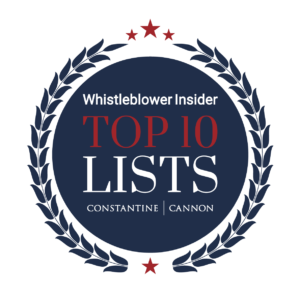Top Ten SEC and CFTC Recoveries of 2020

Despite its many shortcomings, 2020 did bring great news for whistleblowers: record-breaking growth in the CFTC and SEC Whistleblower Programs, as well as massive enforcement actions by both agencies. In this post, we will detail the Top Ten SEC and CFTC recoveries of 2020 in cases other than FCPA enforcement. As detailed below, the SEC netted billions of dollars in penalties and restitution from companies accused of registration violations and of all kinds of securities frauds, including several accounting frauds and other misrepresentations to investors. Meanwhile, the CFTC continued to root out manipulators in the commodities markets.
These major enforcement actions, detailed below, signal more awards to come under SEC and CFTC’s wildly successful whistleblower programs. As we’ve previously reported, 2020 was a blockbuster year for the SEC Whistleblower Program, with approximately $350 million in awards to dozens of whistleblowers, including its largest-ever whistleblower award of $114 million. The SEC also tripled its pace in issuing awards, addressing a longstanding backlog of award applications, and ensuring meritorious whistleblowers are more promptly rewarded. The CFTC Whistleblower Program also had remarkable successes, paying roughly $20 million to whistleblowers and receiving more tips than ever before.
Without further ado, here are the Top Ten SEC and CFTC recoveries of 2020 in cases other than FCPA enforcement, with links to more information about each of the cases:
- Telegram – In June 2020, the SEC netted the biggest recovery of the year in a settlement with cryptocurrency giant Telegram Group Inc. and its subsidiary TON Issuer Inc., resulting in the return of more than $1.2 billion to investors and a $18.5 million civil penalty. The settlement resolved SEC charges that Telegram conducted an unregistered offering of its digital tokens called “Grams.” The SEC alleged that the Grams were securities sold by defendants in order to raise capital for their own business, which included the development of their own blockchain and a mobile messenger application. The SEC’s settlement marked its most aggressive foray yet into the cryptocurrency space, which is sure to remain a hot area in years to come.
- JPMorgan Chase – The number two spot goes to a collaborative effort between the CFTC, the SEC, and DOJ resulting in a joint settlement that required JPMorgan Chase & Company and its subsidiaries to pay $920 million to the CFTC and $35 million to the SEC, as well as enter into a three-year deferred prosecution agreement with the DOJ. The settlement resolved charges that JPMorgan Chase engaged in spoofing and other market manipulation over at least eight years involving hundreds of thousands of spoof orders in precious metals and U.S. Treasury futures contracts. The case, brought by the CFTC’s Spoofing Task Force, demonstrates that spoofing remains a high priority for the CFTC.
- Wells Fargo – As part of a gargantuan $3 billion joint settlement with the federal government, Wells Fargo paid the SEC $500 million to resolve allegations that it misled investors, opened fake accounts for unknowing customers, and sold customers unnecessary products that went unused. Specifically, Wells Fargo inflated a key “cross-sell” metric—a measurement of how many additional financial products it sold to existing customers—by opening millions of unauthorized accounts. The settlement resolved one of the most egregious financial scams since the financial crisis, which also resulted in a $575 million 2018 settlement with 50 states and the District of Columbia and a $100 million 2016 fine from the CFPB.
- General Electric – In December 2020, General Electric Co. (GE) agreed to pay $200 million to settle SEC charges over allegations of accounting fraud, including that it misrepresented the nature of its profits and failed to disclose risks in its insurance business. When these issues were finally disclosed, GE’s stock plummeted by almost 75%. This is one of several accounting schemes to make this year’s Top Ten list, signaling the SEC’s renewed focus on financial reporting.
- The Bank of Nova Scotia (Scotiabank) – At number five is another joint effort between the CFTC and DOJ, in which Scotiabank paid $127.4 million to the CFTC and $60.4 million in criminal fines, forfeiture, and restitution to the DOJ for attempting to manipulate prices and spoofing in precious metals futures contracts, making false and misleading statements to investigators, and failing to comply with the CFTC’s regulatory requirements for swap dealers. This is the second Top Ten entry arising out of the CFTC’s Spoofing Task Force, underscoring the importance of spoofing in the CFTC’s enforcement priorities.
- Luckin Coffee – Our sixth entry demonstrates the global reach of the SEC’s antifraud enforcement. China-based Luckin Coffee paid a penalty of $180 million to resolve charges that it materially misstated its revenue, expenses, and net operating losses to trick investors into thinking the company was rapidly expanding and to meet earnings estimates. Specifically, the SEC alleged that Luckin intentionally fabricated more than $300 million in retail sales by using related parties to create false transactions. Luckin raised more than $864 million from debt and equity investors during the relevant time period. The SEC was able to assert jurisdiction over Luckin because its American Depositary Receipts were traded on NASDAQ until they were delisted in June 2020.
- BlueCrest Capital Management Limited – In another enforcement action of international dimension, the SEC obtained a $170 million settlement from UK-based investment adviser BlueCrest Capital Management Limited over charges that it moved its top trades from its premier client fund to an in-house proprietary fund and then put the client’s funds under the control of an underperforming algorithm. According to the SEC, BlueCrest failed to properly disclose this bait and switch to its clients.
- SCANA Corp. – In December 2020, energy company SCANA Corp. agreed to pay a $25 million penalty and $112.5 million in disgorgement to settle SEC charges that the company, its subsidiary, and top executives Kevin Marsh (former CEO) and Stephen Byrne (former executive VP) defrauded investors by making false and misleading statements concerning a nuclear power plant expansion that they said would qualify the company for more than $1 billion in tax credits. The defendants knew the project was far behind schedule and likely to be scrapped, but their false statements led investors to buy more than $1 billion in bonds, ultimately leading to millions of dollars in investor losses.
- Bausch Health (formerly Valeant Pharmaceuticals) – In yet another case of accounting fraud, the SEC obtained a $45 million penalty from Bausch Health, formerly known as Valeant Pharmaceuticals, to resolve charges that its executives engaged in improper revenue recognition and misleading disclosures in SEC filings and earnings presentations. Among other things, the SEC alleged that Valeant improperly recorded sales to a specialty pharmacy, Philidor Rx Services, under Valeant’s control. The SEC also charged senior executives in connection with the scheme, requiring former CEO Michael Pearson to pay $250,000, CFO Howard B. Schiller to pay $100,000, and former controller Tanya Carro to pay $75,000. Pearson and Schiller also returned $450,000 and $110,000, respectively, in incentive compensation.
- VALIC Financial Advisors – Finally, in another large settlement involving financial advisors, VALIC Financial Advisors paid $40 million to resolve SEC charges that deliberately steered clients to more expensive mutual funds for which VFA received both 12b-1 fees and revenue sharing from the clearing broker, while also receiving advisory fees from its clients and telling those clients those fees would cover execution costs. In addition, the SEC alleged that VFA failed to disclose that its parent company paid a kickback to an entity associated with Florida teachers’ unions in exchange for an endorsement of VFA as its preferred financial services partner. In a creative settlement, VFA also agreed to provide Florida K-12 teachers who participate in VFA’s advisory product with its most favorable rates in the Florida K-12 market.

Annual Whistleblower Insider Top Ten Lists
Every January, Whistleblower Insider looks back at the significant government enforcement actions of the past year. Our Top Ten lists highlight the biggest recoveries and significant enforcement efforts by different government actors in cases of interest to whistleblowers.
Browse Top 10 Lists
Read More:
- Financial & Investment Fraud
- SEC Enforcement Actions
- CFTC Enforcement Actions
- The SEC Whistleblower Program
- The CFTC Whistleblower Program
- Securities Fraud
- Accounting Fraud
- Cryptocurrency Fraud
- Fraud Regulated by the CFTC
- Market Manipulation
- Related Post: SEC makes its annual whistleblower report to Congress – SPOILER ALERT: BEST YEAR EVER!
- Related Post: Record-Setting Submissions: CFTC Whistleblower Program 2020 Annual Report Documents Increasing Popularity of Program
Tagged in: Accounting Fraud, CFTC Whistleblower Reward Program, Cryptocurrency, Financial and Investment Fraud, Fraud in CFTC-Regulated Markets, Market Manipulation and Trading Violations, SEC Whistleblower Reward Program, Securities Fraud, Top 10,